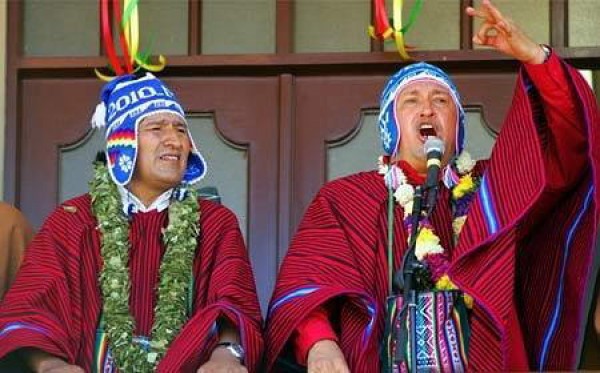
Bolivian President Evo Morales and Venezuelan President Hugo Chavez during Chavez’s tour of Bolivia. (Sigloxxi Ultima Hora)
The Washington Post’s Juan Forero recently published an article on the erosion of democratic institutions in Latin America. Among the “new authoritarians” he cites as responsible for the decline are Hugo Chavez and several of his key allies, namely Ecuador’s Rafael Correa, Bolivia’s Evo Morales and Nicaragua’s Daniel Ortega. All of them have ridden roughshod over constitutional checks such as term limits and freedom of the press. No news here.
But Forrero then empretzels himself in an apparent attempt at even-handedness. He points to “pro-American” presidents that have taken liberties with democratic institutions:
In the past 20 years, pro-American, democratically elected leaders in the region have weakened democratic governance, according to the New York-based group Human Rights Watch, which closely monitors several countries here. In Colombia, Alvaro Uribe pushed through a legally questionable constitutional reform to run again in 2006, and his aides are under investigation for their role in an illegal spying scandal on the Supreme Court. In Peru, Alberto Fujimori closed the Congress.
That’s history: Uribe left office with 70% approval ratings in 2010, while Fujimori left office in 2000 and has been in jail for almost five years. Simple as it sounds, actually leaving office should disqualify one from inclusion in the article.
In the search for a present-day pro-American authoritarian, Forero invokes Ricardo Martinelli, Panama’s president since 2009, who’s accused of packing the Supreme Court with allies and “using the power of the purse to reward allies.” These charges make for a laughable comparison with the likes of Correa.
Curiously, not one mention is made of Cristina Fernandez in the article. Yet her reign includes the sacking of Martin Redrado, a defiant central bank governor, and the politicization of Argentina’s statistics agency. It should be no surprise that independent economists estimate that inflation is double what the government reports.
In sum, the new wave of authoritarianism in Latin America isn’t new, it started in the mid-2000s when Hugo Chavez began flooding Venezuelan oil money into chronically weak democracies across the region. And despite Forero’s attempt to muddle the issue, the authoritarianism on display in Latin America today is squarely in the wheelhouse of the anti-American left.